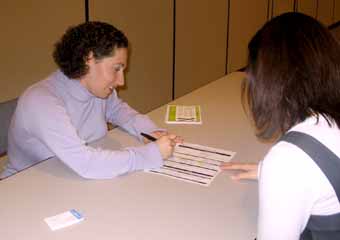Unveiling my body’s secrets
Permanent link All Posts

Genetic Counselor Michelle Gilats talks with a participant at a genetic testing session
We are born with secrets. And our bodies are very effective at hiding them from us for generations.
Until April, my body had secrets, too. But thanks to four blood samples, I now know much more about my genes than I ever dreamed about.
Ashkenazi Jews like me might carry genetic mutations that cause everything from Tay-Sachs to cystic fibrosis to the funny-sounding maple syrup urine disease. The fact that no one in my family has manifested any symptoms doesn’t mean that they aren’t carriers. In fact, 11 different disorders are about 20 to 100 times (depending on the mutation) more common among Azhkenazi Jews than the general population. If you are Sephardic, you’re not off the hook just yet: A host of mutations might have found its way into your family, too.
Armed with this knowledge, I signed up for a genetic testing session through the Chicago Center for Jewish Genetic Disorders. The Center provides testing for mutations leading to nine most common disorders, including ones that cause the lungs to stop functioning (cystic fibrosis) or rapid progressive deterioration of the brain and the nervous system (Tay-Sachs) or a predisposition to cancer (Bloom’s syndrome). Each of us could be a carrier of these and not even know it. And even if both parents are carriers, the chance of having an affected offspring is 25 percent, according to laws of Mendelian inheritance.
“One of the benefits of the testing is that you can be prepared for the risk you might have,” says Rachel Sacks, the community outreach coordinator at the Center. “You can choose different options, be prepared for the birth of an affected child. If you find out that your risk has been greatly reduced, it can be big relief for people as they are deciding when to have children.”
As my husband and I walked into the social hall at Chicago Sinai Congregation in late April, we didn’t know what to expect. We were among the first and so were given an early slot for the consultation with a genetic counselor and the visit to certified nurses from Children’s Memorial, who would be drawing our blood samples. The room slowly filled up: Most attendees were in their twenties and thirties; some were with partners, others had come alone. At our table sat a woman in her late 20s with her non-Jewish fiancé; two lawyers in their late 30s; and two graduate students.
“When the program began in 2002, it was geared toward college students,” Sacks says. “Since then, we’ve found a higher demand among young professionals and have shifted focus. We still welcome college students and have a student rate, though. Most people who attend tend to be about one to five years from having children, and so among students we mostly see graduate students.”
Following dinner, Genetic Counselor Michelle Gilats gave us a mini lesson in genetics, explaining the dominant characteristics of each disease and the process of inheritance. Then, each person or couple briefly met with Michelle or another genetic counselor and walked on to the nurses, who drew four small vials of blood. The blood was sent to a private lab in New York, which works with not-for-profit centers like the ones in Chicago and Arizona. At $90 per person, the screening is heavily subsidized, reducing what could be a $3,000 bill.
After that evening in April, I promptly forgot about the whole thing. Although my husband and I have been married for almost three years, we’ve barely broached the subject of kids. It’s just the two of us – and that’s fine with us for now. Every time our parents ask us about future grandchildren, we tell them ‘we are still practicing.’
For others, genetic testing is an integral part of making reproductive decisions. One result could completely alter a couple’s plan: discovering that they are both carriers of the same mutation.
“Surprisingly, of the couples we’ve screened together, we haven’t had that happen yet,” Sacks says. “Still, with technology we have today, carrier couples have a lot of options.”
These options can range from prenatal and newborn testing to forgoing having biological children to adoption. Another option is preimplantation genetic diagnosis, which was pioneered by Chicago scientist Yury Verlinsky and involves testing embryos.
After not thinking about the whole thing for eight weeks, I got a call in late June from the Center’s genetic counselor telling me that yet another of my body’s little mysteries was solved. Turns out, my husband and I are perfectly compatible—even on the genetic level!
If you want to delve into your genetic mysteries, the Center offers four screenings a year. All slots for the Sept. 1 and Dec. 8 screenings are filled, but the Center will hold more sessions in March and May 2010. Contact Taryn Brickman at the Center at tarynbrickman@juf.org or 312-357-4988 for more info.



.jpg)



